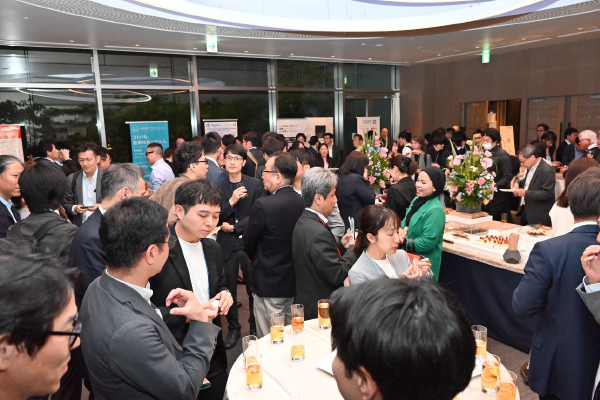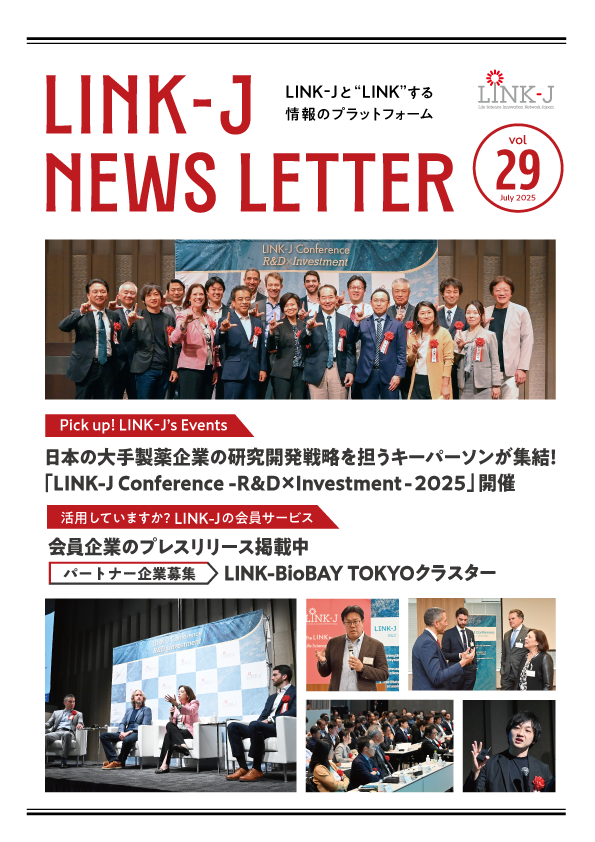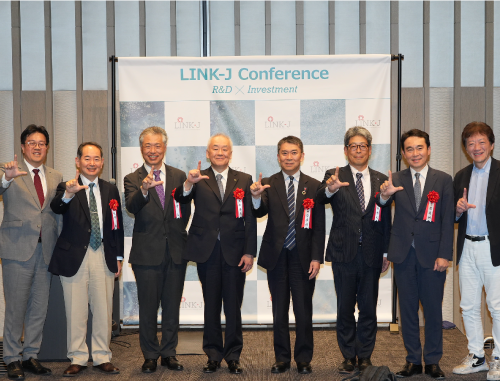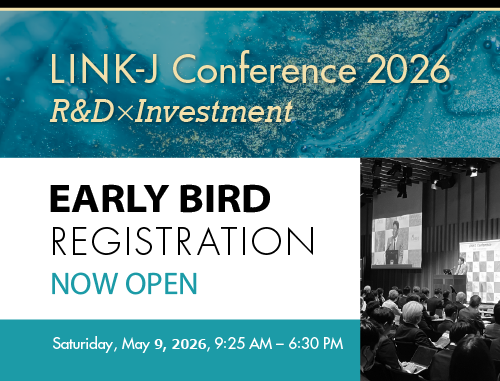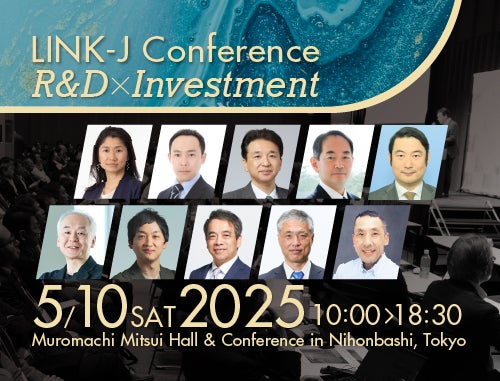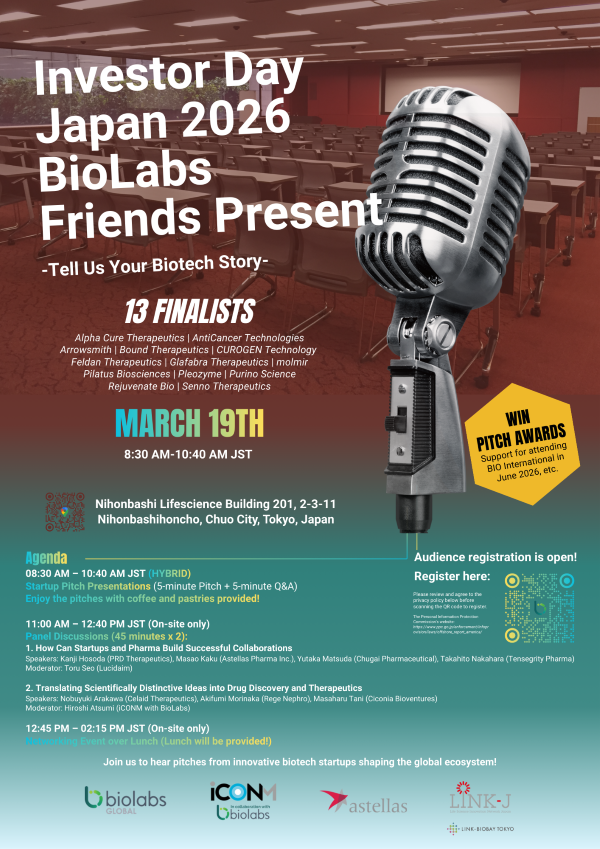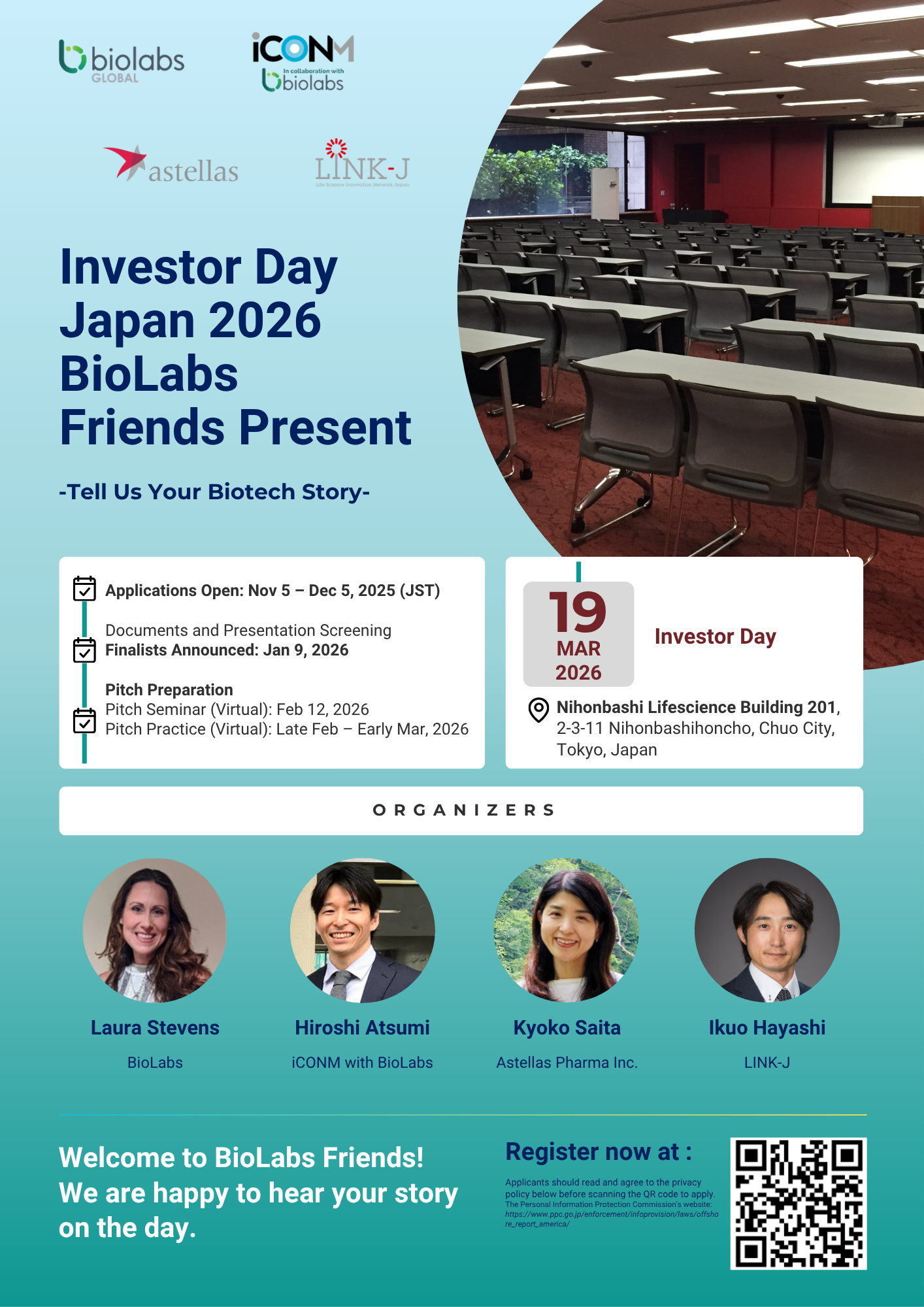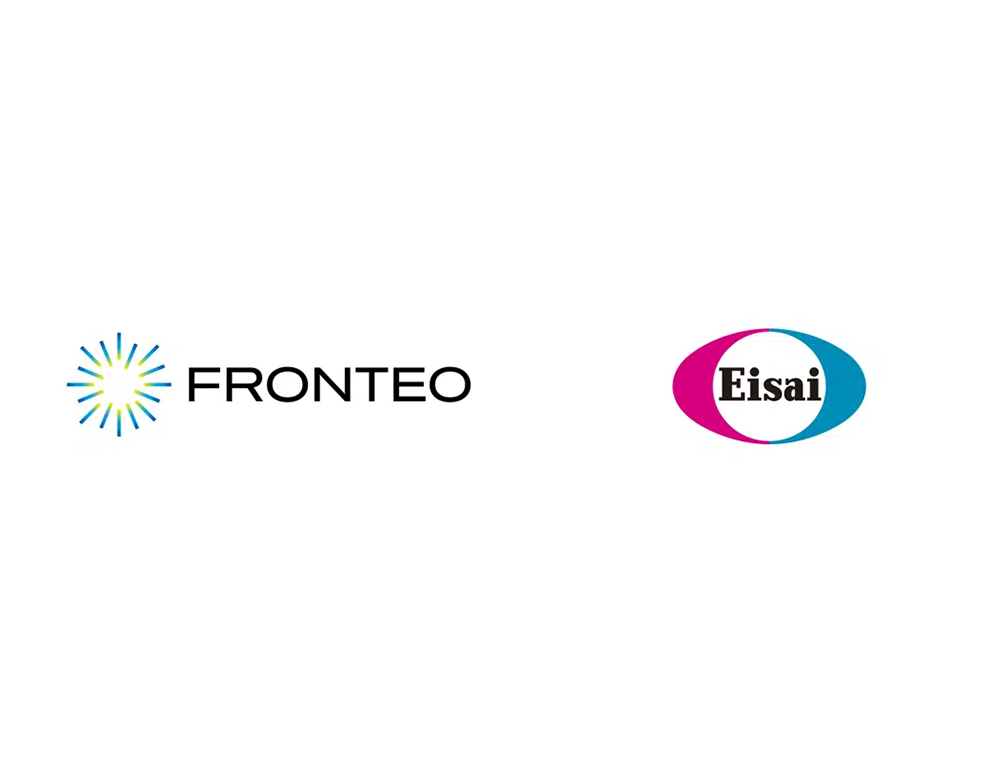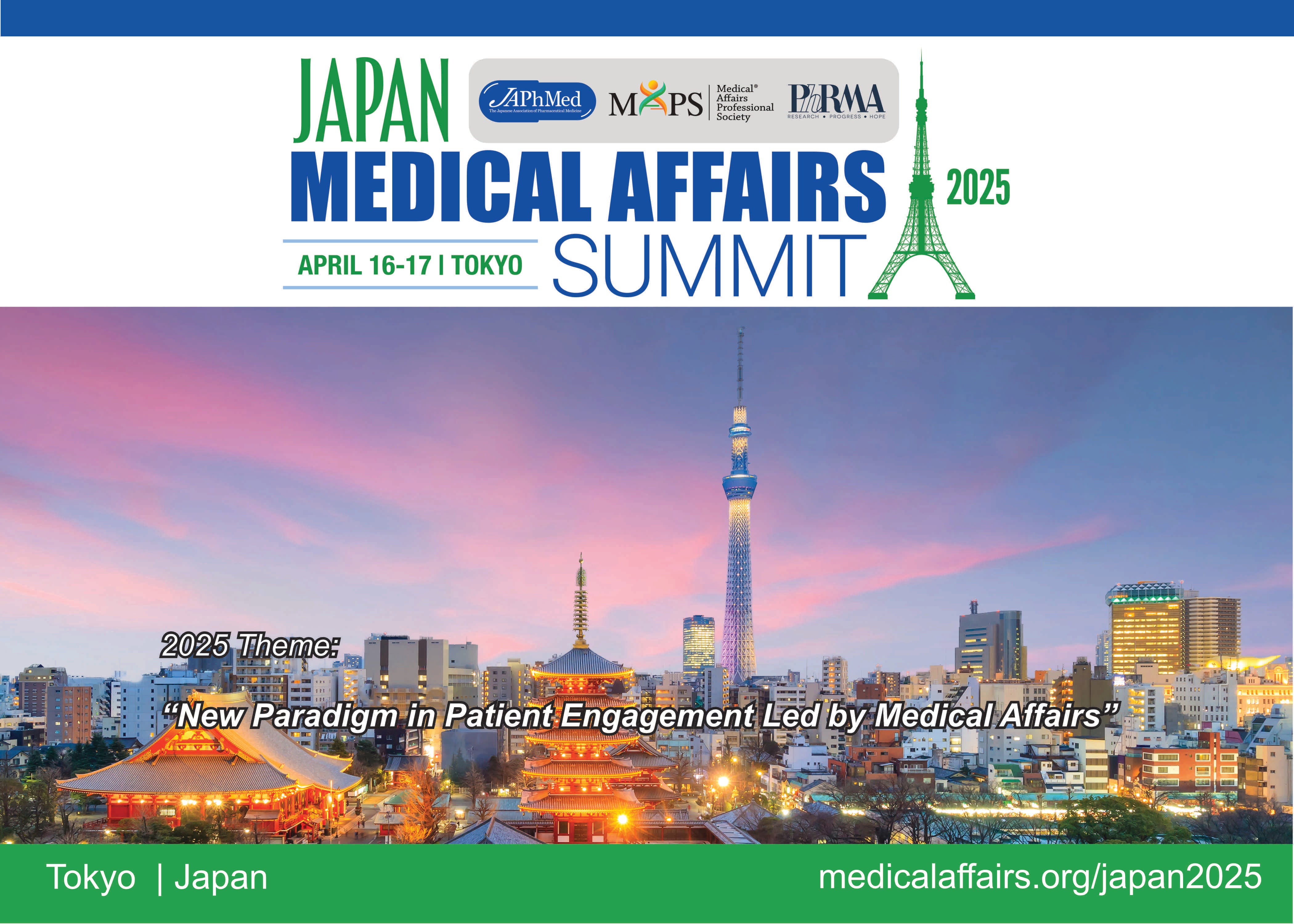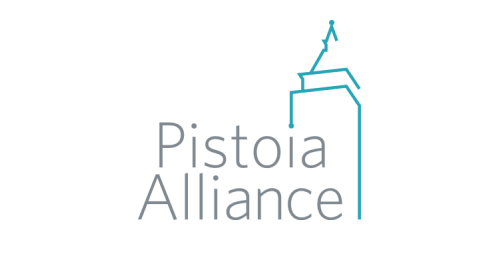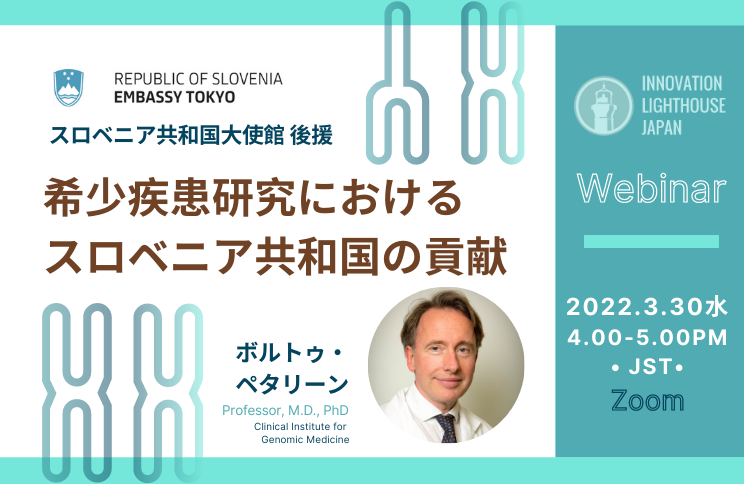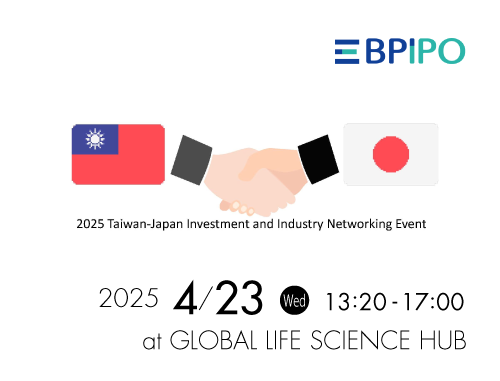― Deepening Dialogue Between Pharma and Investors:
Lively Exchange Among 200 Participants ―
LINK-J Hosts "LINK-J Conference - R&D × Investment - 2025" Over Two Days in May
LINK-J held its large-scale symposium, "LINK-J Conference - R&D × Investment - 2025," over two days on May 9 and 10, 2025.
Building on the success of the previous year, the 2025 edition featured an expanded program. On the first day, a closed-door roundtable was held as Part 1, bringing together R&D leaders from Japanese pharmaceutical companies and domestic and international investors for in-depth discussions.
The second day featured Part 2 of the conference, with presentations from R&D heads of Japanese pharmaceutical companies and a dynamic panel discussion in the form of a Fireside Chat, joined by both domestic and international venture capitalists. The session sparked lively dialogue on the future of drug discovery and investment.
On the second day, the venue—Muromachi Mitsui Hall & Conference—featured exhibition booths by industry associations and biotech startups. Following the main program, a standing reception and networking session were held, providing an opportunity for the approximately 200 on-site participants to engage in active exchange and build new connections.
Host: LINK-J
Sponsor:Japan Agency for Medical Research and Development(AMED)
Support:Forum for Innovative Regenerative Medicine(FIRM)
Japan Pharmaceutical Manufacturers Association(JPMA)
Greater Tokyo Biocommunity(GTB)
Biocommunity Kansai(BiocK)

<May 9, 2025>
Part 1: Roundtable Discussion
The session began with insights of an overview regarding investment trends in the life sciences sector from the perspective of a global venture capital firm.Participants then split into two groups for in-depth discussions on the current state and challenges of Japan’s drug discovery ecosystem. The roundtable format encouraged candid and constructive dialogue, with the in-person setting allowing for dynamic exchanges of real-world perspectives.
To conclude the session, all participants reconvened as group moderators shared key discussion points. By bringing together diverse viewpoints, the session highlighted fresh perspectives and ideas for advancing Japan’s life science ecosystem.
<May 10, 2025>
Part 2: Conference
【Session 1】
■Opening & Purpose Explanation
Shunichi Takahashi(President & COO, LINK-J)
.png)
As LINK-J marks its 9th anniversary this year, the organization reaffirmed its commitment to supporting Japan’s innovation ecosystem by strengthening startup support and international collaboration through a wide range of future initiatives.
■Keynote Speech 1: Investment Trends and Future Outlook in the
Pharmaceutical and Biotechnology Industry
Daisuke Yoshizumi(JPMorgan Securities Japan Co., Ltd. Investment Banking,
Managing Director Head of Japan Healthcare)

Mr. Yoshizumi, speaking from the perspective of a financial institution that supports corporate fundraising and business development, outlined five key factors necessary for investors to show strong interest in the biopharma industry. He then provided an overview of how each of these factors is currently evolving. He noted that while the sector experienced a surge in investment during the 2020–2021 boom, funding slowed significantly in 2023. Although signs of recovery are beginning to emerge, he pointed out that policy uncertainty under the current U.S. administration continues to pose challenges.
However, he emphasized that investors currently have cash on hand, and that the key challenge for the biopharmaceutical industry going forward will be how to re-engage investors amid competition from other industries.
■基調講演2:Building Innovation Ecosystems
Johannes Fruehauf, Dr., MD(Founder and President, BioLabs Global Inc.)
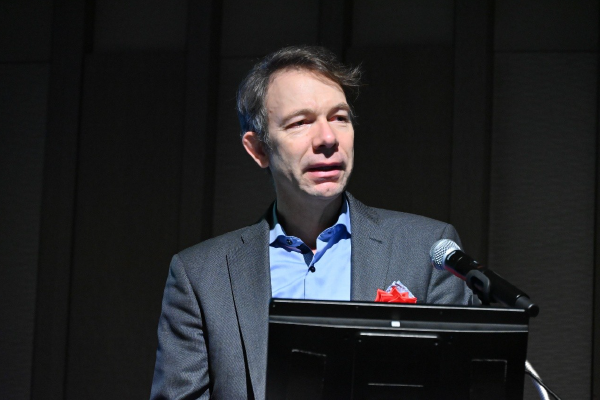
In the biotech sector, translating academic ideas from universities into startups through technology transfer not only benefits patients, but also generates economic returns for academia. Fruehauf emphasized that this translation of innovation is a critical challenge for strengthening Japan's ecosystem and highlighted the need for academia to take on the mission of driving innovation for society and patients. Drawing on his experience supporting scientists in entrepreneurship globally, he emphasized that to make an innovation ecosystem function, support for talent development, technology transfer, and venture capital (VC) backing are essential. Finally, he stated, “The next five years will be decisive for Japan.”
■Fireside Chat 1
Moderator: Ken Horne(Managing Partner, AN Venture Partners)
Speakers: Aiden Aceves(Vice President, Insight Partners), Christine Brennan, Dr.(Managing Director, Vertex Ventures), John Gutierrez, MD(Vice President, Ascenta Capital)
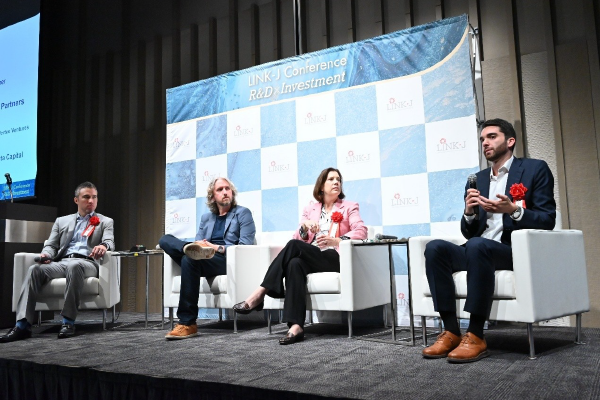
At the end of Session 1, a fireside chat was held with four VCs from Japan and overseas. Each participant shared lessons learned from their investment activities, both successes and failures, and discussed the state of the ecosystem in their respective regions. They also commented on areas for improvement in Japan's ecosystem as follows.
Aiden Aceves: While there are several areas in need of improvement, a key priority is to establish a framework that simplifies the approval process and facilitates development by removing the requirement for mandatory participation of Japanese patients in clinical trials.
Christine Brennan: Researchers should be encouraged to take on challenges without viewing failure as something negative. I hope that greater public–private collaboration will expand the scope of support, allowing more emerging innovations to receive the backing they need.
Ken Horne: In Japan, the long timelines for research and development often result in a compelling scientific narrative. The country also benefits from a single-payer healthcare system, which offers certain advantages. However, entrepreneurial spirit remains underdeveloped, and there is room for improvement in the regulatory landscape.
John Gutierrez: One of the more accessible steps is to attend conferences such as the J.P. Morgan Healthcare Conference, where companies can meet with investors and gain a broader understanding of the biotech industry landscape. For Japanese biotech companies, participating in such events can be extremely valuable.
【Session 2】
■Speech 1: DAIICHI SANKYO: Past, Present, and Future
Teiji Wada(Head of Research Innovation Planning Department, Daiichi Sankyo Co., Ltd.)
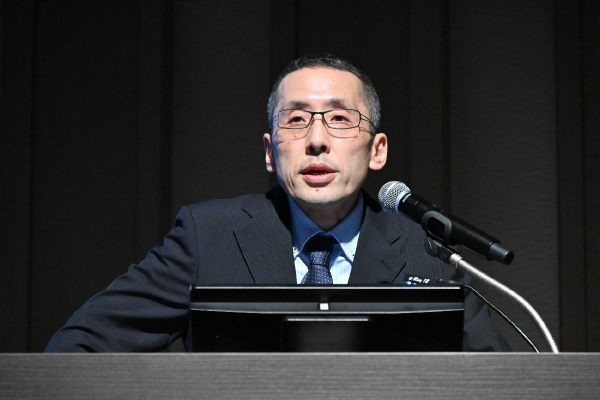
Daiichi Sankyo, formed through the merger of Sankyo and Daiichi Pharmaceutical, has established its own unique technology and built a drug discovery platform through a multimodality strategy, enabling it to develop and launch innovative pharmaceuticals from its own research facilities in Japan. DXd ADC, born from the fusion of the strengths of Sankyo and Daiichi Pharmaceutical, achieved practical application in just nine years from the formation of the research team. Dr. Wada stated, “The key to our success lies in the integration of science and technology through craftspersonship,” and introduced measures to strengthen collaboration with external partners to accelerate the development of innovative new drugs. Looking ahead to the increasing complexity of drug discovery, the company is also focusing on data-driven drug discovery approaches leveraging digital technologies such as AI and machine learning.
■Speech 2: External Innovation: Strategic Alliance Based on Future Vision Created by One’s Own Discerning Eye
Takashi Owa, Dr. (Senior Group Officer, External Innovation, DHBL, Eisai Co., Ltd.)

Dr. Owa presented two examples based on the idea that external innovation is closely linked to strategic alliances based on future vision created by one’s own discerning eye. The first example is CBP/β-catenin inhibitor. This is a medium-sized compound that inhibits the protein-protein interaction between β-catenin, which plays an important role in the Wnt signaling pathway, and CBP (CREB-binding protein). The second example is a molecular glue-type protein degradation inducer being developed in collaboration with the National Cancer Center. Both are in areas where competition is expected to intensify, and Dr. Owa stated that they are considering partnerships with external partners with an eye on future potential. He emphasized that collaboration between academia, industry, and government is necessary to leverage Japan's strengths.
■Speech 3: Astellas’ R&D Strategy
Hide Goto, Dr. (Management Head, Open Innovation , Innovation Lab, Astellas Pharma Inc.)
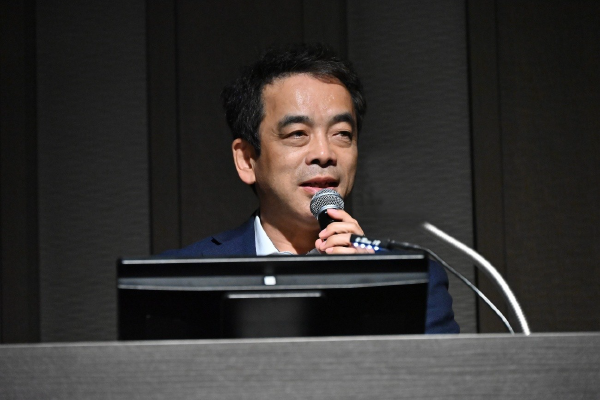
Dr. Goto introduced the transformation currently underway at Astellas, explaining that the company has launched a new integrated initiative based on its vision and focused on patients, and introduced a treatment strategy called the Focus Area Approach, which involves identifying priority areas and concentrating resources on them. As part of its efforts to leverage regional strengths through open innovation, he introduced SakuLab, newly established within the Tsukuba Research Center; TME iLab in Kashiwa-no-ha (Chiba Prefecture); and SakuLab–Cambridge, located within the Cambridge facility. Additionally, Astellas is accelerating collaboration with startups and academia by co-hosting the “Changing Tomorrow” pitch contest with LINK-J and establishing a joint venture with Takeda Pharmaceutical Company Limited and Mitsubishi UFJ Financial Group, Inc. to incubate drug discovery seeds.
■Speech 4: Environment surrounding Drug Discovery Research and Sumitomo Pharma’s Goals of New Drug Creation
Isao Shimizu, Dr.(Executive Officer, Deputy Head of R&D Headquarters (Drug Discovery Research), Sumitomo Pharma Co., Ltd.)

Regarding the challenge of low success probability in drug discovery, Dr. Shimizu pointed out that “in order to increase success probability, it is essential to strengthen academia and start-ups and to enhance the research and development capabilities of Japanese pharmaceutical companies themselves.” In particular, he stated that for Japanese pharmaceutical companies that do not have the financial resources of global mega-pharmaceutical companies, it is important to develop research strategies that leverage their strengths and to strengthen their pipelines through small- to medium-scale open innovation. Additionally, the company highlighted its efforts to advance drug discovery research in its priority disease areas of oncology and neuropsychiatry, including global initiatives toward the practical application of iPS cells and the development of a novel universal influenza vaccine with broad preventive effects against various influenza viruses.
■Fireside Chat 2
Moderator: Omar Khalil(Managing Director, Santé Ventures)
Speakers: Johannes Fruehauf, Dr., MD(Founder and President, BioLabs Global Inc.), Dr. PeiSze Ng(Leaps by Bayer, Director, Venture Investments), Taro Inaba(Managing Partner, Remiges Ventures, Inc.)

Four VC representatives from Japan and overseas took the stage and engaged in lively discussion about Japan's ecosystem from the perspective of globally active investors. In response to the moderator's question, “What needs to change in Japan's ecosystem to make it a more suitable environment for biotech startups?”, the panelists shared specific issues and proposals from their respective perspectives.
PeiSze Ng: Diversity of talent is essential. Creating an environment that welcomes entrepreneurs looking to enter Japan can be highly effective, as cross-cultural exchange often leads to new ideas and innovative approaches.
Johannes Fruehauf: Accelerating cultural change in Japan is essential. To achieve this, it is important to expose the next generation of scientists to successful role models.
Taro Inaba: For a long time, Japan has shared the same values, and there is a culture of mutual understanding without the need for explicit communication. However, if Japan aims to succeed in the global market, this culture must evolve. Biotech companies need to clearly explain the potential and value of products that are still in the development stage, and presentation skills are an important skill.
【Session 3】
■Greeting
Hirokazu Shimoda(Service Industry Policy Group, Ministry of Economy, Trade and Industry(METI))
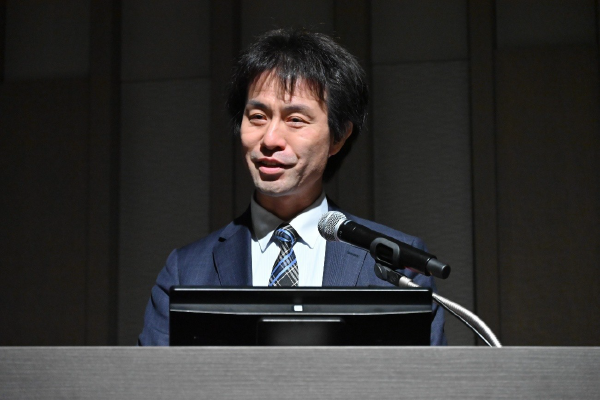
Mr. Shimoda emphasized that the Japanese government is currently committed to strengthening Japan's drug discovery capabilities and is determined to nurture Japan's “treasure trove” over the next 10 to 20 years. He also stressed the need to actively participate in the global ecosystem from a global perspective, leveraging the strengths of the Japanese people, namely their sincerity and trustworthiness.
■Keynote speech 3: Bridging Invention and Innovation
Takanori Takebe(Professor, Graduate School of Medicine, The University of Osaka/
Professor, Institute of Integrated Research, Institute of Science Tokyo/ Director, Communication Design Center, Yokohama City University/ Associate Professor, Director of Commercial Innovation, Center for Stem Cell & Organoid Medicine, Cincinnati Childrenʼs Hospital Medical Center)
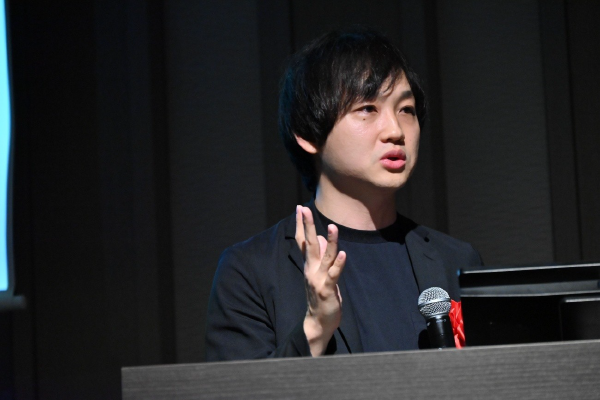
Dr. Takebe began his career as a transplant surgeon and is currently leading cutting-edge research and development projects. One of these is the discovery of the enteral ventilation (EVA), for which he was awarded the Ig Nobel Prize in 2024. He is also engaged in research on organoids using iPS cells, aiming to practicalize organoids. Dr. Takebe explained the difference between invention and innovation, emphasizing the importance of recognizing which one is currently pursuing. Drawing from his own experience, he is also working on creating communities that foster momentum for innovation. “Invention transforms into innovation when society changes. With significant changes occurring in the United States today, I expect Japan and the United States to take on even greater leadership roles.” He concluded his remarks with this statement.
■Speech 5: Takeda R&D Strategy driven with Open Innovation
Yasushi Kajii, Dr.(Head, R&D Japan Region, Takeda Pharmaceutical Co., Ltd.)

Takeda Pharmaceutical has its roots as a pharmaceutical company with a long history originating in Japan, but now operates as a global biopharmaceutical company, collaborating with external partners to focus on the research and development of innovative pharmaceuticals. Dr. Kajii highlighted current activities, including the recent initiation of a physician-led clinical trial using iPS cell-derived pancreatic islet cells within the T-CIRA joint research platform with Kyoto University's iPS Cell Research Institute (CIRA), and the accelerated development of CAR-T therapy using iPS cell-derived T cells through external partnerships toward practical application. He also mentioned the launch of a strategic collaboration with Tohoku University, called “Project Soten” aimed at addressing the challenge of efficiently advancing clinical trials in Japan.
■Speech 6: Research and Development at Chugai Pharmaceutical
Hitoshi Iikura, Dr. (Director, Head of R&D, Chugai Pharmaceutical Co., Ltd.)
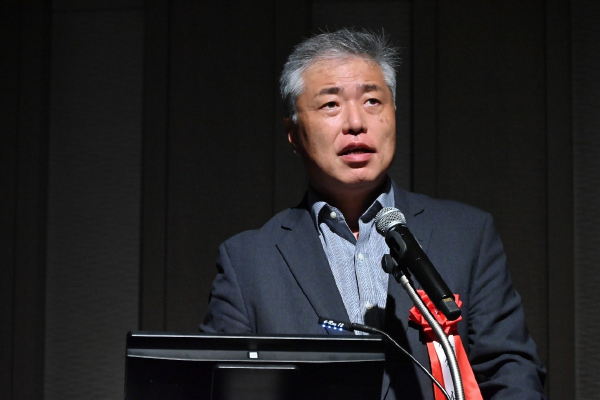
Through a strategic alliance, Chugai has become part of the Roche Group, gaining strengths in late-stage clinical development due to the influx of numerous drug candidates. This has led to the launch of many pharmaceutical products, expanding revenue, which has been reinvested in the development of new drug discovery technologies. Dr. Iikura stated, “Chugai's competitive advantage lies in modality technology,” and introduced the progress being made toward commercialization of innovative antibodies created through the company's proprietary antibody engineering technology. The company is also tackling drug discovery for “tough targets” that are difficult to address with conventional antibodies or small molecules, and is advancing the establishment of technology and drug discovery capabilities in the mid-sized molecule domain. To strengthen its early-stage clinical development capabilities, a key challenge, the company is promoting open innovation through collaborations with academia and the establishment of external partnerships.
■Speech 7: Santen Global R&D - Strategy and Activity -
Kazuhito Yamada(Head of Pharmaceutics and Pharmacology Department, Santen Pharmaceutical Co., Ltd)

For over 130 years since its founding, the company has been dedicated to maintaining and improving people's eye health, with the goal of achieving “Happiness with Vision.” Mr. Yamada emphasizes that the company's strengths lie in its unique ophthalmic research technology, formulation technology, and expertise in clinical trials specific to the ophthalmic field, all of which have been cultivated through years of specialized experience. While advancing solution development in areas with limited treatment options, such as myopia, presbyopia, retinitis pigmentosa, and ptosis, the company also prioritizes addressing unmet needs in conditions like allergies, dry eye, and glaucoma. As concrete examples, the company highlighted efforts to enhance safety through preservative improvements and to improve convenience by changing the formulation of an anti-allergic conjunctivitis treatment from eye drops to cream.
■Fireside Chat 3
Moderator: Aya Kubota(Editor in Chief Nikkei Biotechnology & Business)
Speakers: Takanori Takebe(The University of Osaka/Institute of Science Tokyo/ Yokohama City University/Cincinnati Childrenʼs Hospital Medical Center), Hitoshi Iikura(Chugai Pharmaceutical Co., Ltd.), Yasushi Kajii(Takeda Pharmaceutical Co., Ltd.), Tai Harada(Partner at Fast Track Initiative, Inc.)
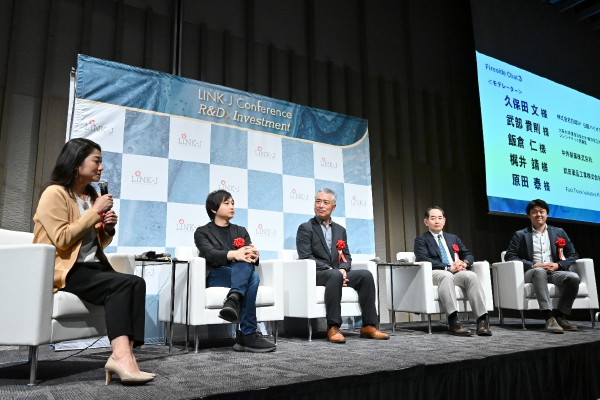
At Fire Side Chat 3, researchers from academia, leaders from the R&D departments of pharmaceutical companies, and investors took the stage to engage in a multifaceted discussion on the current state and challenges of drug discovery in Japan. In particular, specific challenges and directions for improvement were pointed out from the perspectives of cultural differences between Japan and the U.S., as well as from the perspectives of academia and industry, with a focus on issues unique to Japan, such as “talent mobility” and “attitudes toward failure.” The session was highly engaging, with global participants sharing their experiences and exchanging in-depth opinions.
Finally, the following comments were shared, reflecting the insights and expectations gained from the symposium.
Tai Harada: As a VC, I felt that I needed to take on the next challenge. I would like to continue collaborating with people in various industries.
Yasushi Kajii: What we discussed over the past two days are issues that we have recognized as challenges for several years but have not yet addressed. Now may be the time to take action on the issues we have been avoiding. I would like to discuss this with everyone.
Hitoshi Iikura: This time, we were able to have a more in-depth discussion than last year. I look forward to seeing how things evolve next time and what kind of world awaits us.
Takanori Takebe: A study suggests that having a sense of purpose in life can extend healthy life expectancy by eight years. Rather than simply performing tasks as work, it is important to approach work with a sense of purpose in order to cultivate seeds.
■Closing
Akihiko Soyama(CEO, LINK-J)

The foundation for promoting Japan's drug discovery capabilities lies in building relationships based on trust between people. He expressed his hope that participants would actively network with each other during the networking opportunities that would follow.
In the foyer next to the conference venue, we set up “Meet UP Booths” where LINK-J special member companies and organizations could share information about their businesses and initiatives. This time, fifteen member companies participated, and various exchanges took place between participants and exhibitors at each booth. Participants were able to learn about new businesses and initiatives, and exhibitors were able to share information about themselves, making the event very popular with both exhibitors and participants.

At the reception and networking event following the conference, attendees had the opportunity to interact with conference speakers and other participants. The floor was filled with enthusiasm as everyone sought to make the most of this valuable networking opportunity.
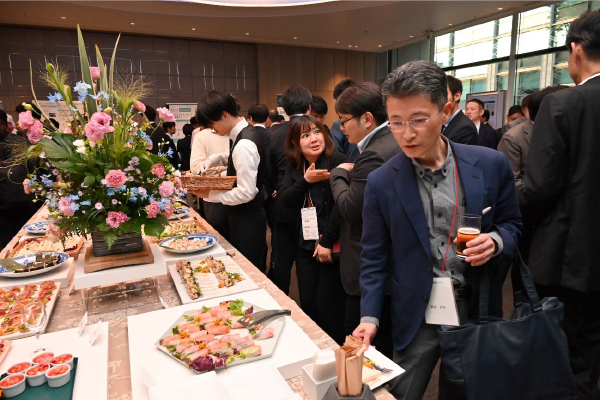
Participants commented that they found it very informative to hear from the heads of multiple pharmaceutical companies.
We would like to express our sincere gratitude to everyone who attended the event in person and to those who listened to the presentations online.
